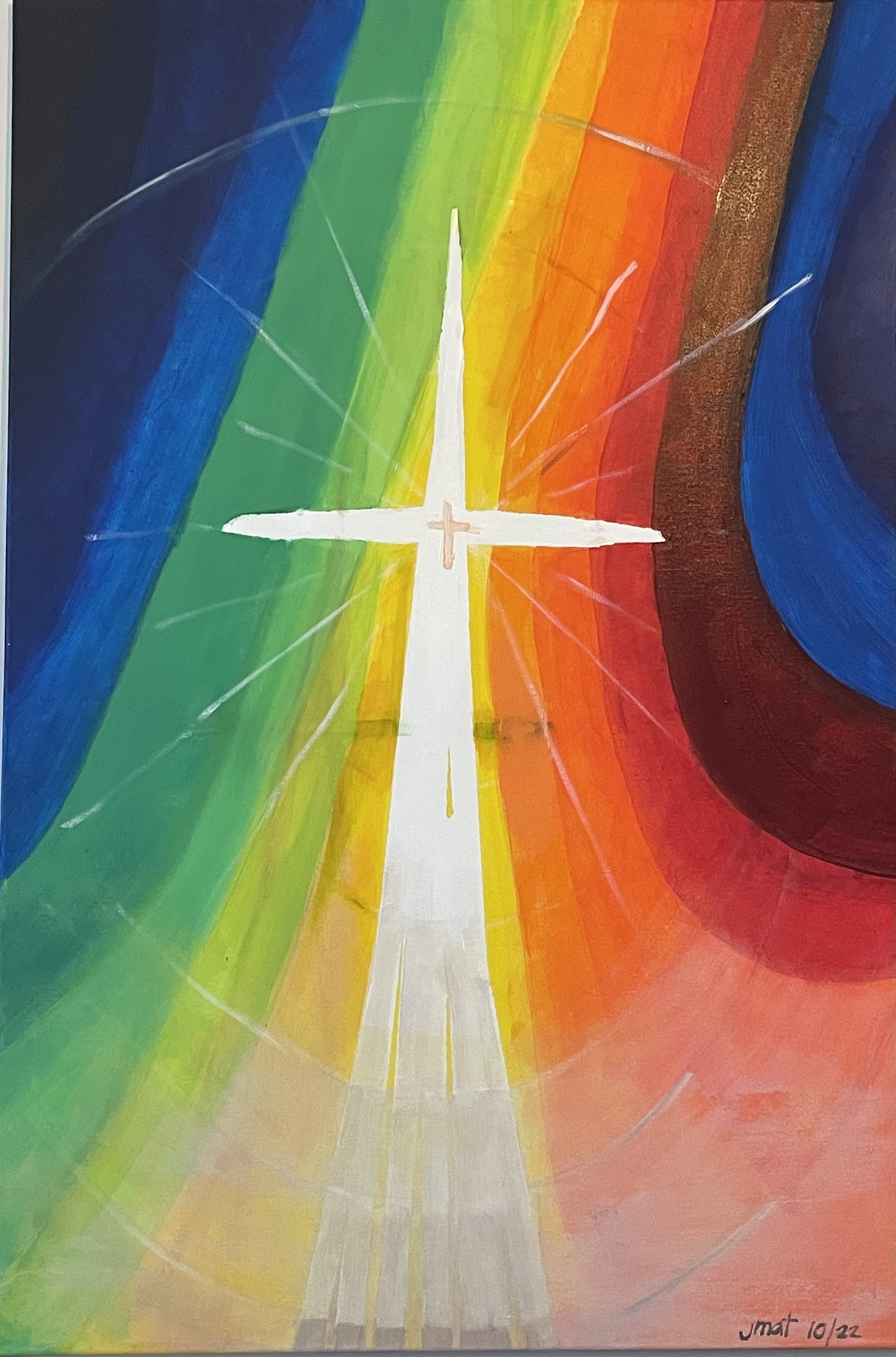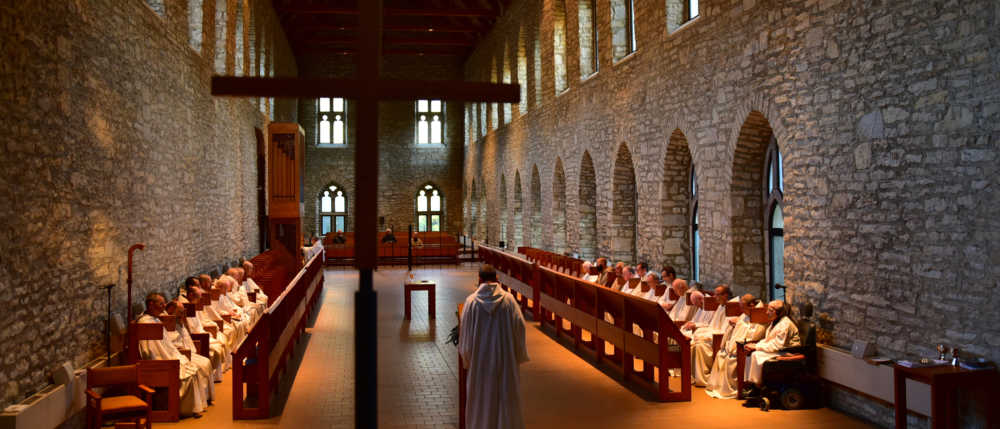Fourth Sunday of Lent
“Surely, we are not also blind, are we?” Jn. 9:40
Today’s Gospel contains one of the most astonishing stories in the entirety of the Bible … and one of the most profound and challenging.
For starters, it reminds me somewhat of a Keystone Cops skit.
You remember them … those incompetent policemen of the silent film era who ran around with great vigor and untold enthusiasm but were so inept that they were never able to solve any of the crimes brought before them. Remember?
But, if you take a closer look at what happens in today’s Gospel story, it not only describes complete ineptitude and willful cruelty, it also brings us to a profoundly deep place.
A man born blind is healed by Jesus.
Astonishing! Astounding! Amazing!
Or, quoting the man born blind:
“It is unheard of that anyone ever opened the eyes of a person born blind.”
And yet, there were people outraged by this once-in-a-lifetime event! And so, in an effort to cover up the reality of this miracle, they simply denied its existence.
The Pharisees insist that Jesus couldn’t possibly have done this because Jesus healed this man on the Sabbath, and no one is allowed to do that!
It’s against the rules.
So, now the Pharisees publicly distract people’s attention by shaming the man’s parents.
But the parents don’t want to have anything to do with this controversy, since it may cause them to be vilified and publicly shamed. Their response then is:
“We do not know how he sees now …. Ask him …. He can speak for himself.”
So, out of fear of punishment by the religious leaders, they toss the “hot potato” back to their son who has just had his sight restored.
Once again, then, the man born blind is forced to tell his story about how Jesus healed him. And, once again, he must endure ridicule from the outraged Pharisees.
The blind man, by now in utter confusion, can only respond to all their questions and threats in this way:
“Only one thing I know is that I was blind and now I see.”
But, again, the Pharisees deny reality by telling him that this could not possibly have happened because it was done on a Sabbath! And everyone knows that’s not allowed.
Therefore, it didn’t happen.
Finally, in total frustration, they drive the formerly blind man out of the synagogue.
The blind man is punished, not celebrated for his miraculous discovery.
Why?
Because his unforgiveable sin is that he broke a man-made law that challenges the religious authorities and their belief system. Consequently, he is treated shamefully.
It is at this point that Jesus comes to find him and reassure him.
“I came into this world … so that those who do not see might see, and those who do see might become blind.”
Among the many things today’s Gospel teaches us is that there is more than one kind of blindness.
In fact, the major irony of this story is that the physically sighted people – the Pharisees, the blind man’s parents, and nameless others – are the truly sightless ones.
They are the ones who are genuinely “blind.” And will remain blind.
As to the man born blind, he experiences a total revolution in his life.
He goes from being a man who, like the woman at the well, never heard of Jesus, but comes to believe he is a “prophet,” and finally falls to his knees and says,
“I do believe, Lord, and worships him.”
And that brings us to you and me – the hearers of this very unusual and radically uplifting story.
So, where do we fit into this?
“Surely, we are not also blind, are we?”
None of us want to see ourselves as being among the “Pharisees.” They’re the bad guys in this story. We don’t even want to see ourselves as the blind man’s parents who are so afraid of the powerful authorities that they don’t want to be involved in any way – even to the point of disowning their own child!
And yet, the reality is that, like the Pharisees, we too often prefer order and certainty and rules and proper decorum over any experience that challenges our way of living.
We, like the parents in this story, don’t want anything to upset our lifestyle or belief systems.
We don’t like unexpected change.
We don’t like how life is constantly shifting, constantly asking us to accept what we don’t want to see – especially if it upsets our comfort zone.
Recently, for example, in the light of the terrors involved in the COVID – 19 disease that has so disastrously affected the world at large, it has been adamantly reported by many to be a problem that never even existed – regardless of the fear and alarm and suffering that has affected so many.
This reality, along with so many social issues involving the unbridled availability of guns, the dangers involving the future of our planet, and the continued battles over issues like racism and women’s rights have been dismissed by many as simply non-existent.
One TV network even went so far as to insist that our Capital was not assaulted on January 6, despite countless testimonies, lawsuits and numerous videos vividly testifying to the reality of it!
These, and so many other concerns, cause us significant alarm. Yet, the reality of outright denial continues to be perpetrated by many.
A form of blindness it seems is affecting so many of us in an increasingly troubling way.
So, if we have always held an assumption that something or someone is “wrong,” then we’d often rather stick with our assumption than irrationally face our fears and prejudices.
And that’s what is so annoying about Jesus:
He is consistently challenging the barriers we set up. He is constantly tearing down walls and upsetting apple carts. He is continually questioning long-held beliefs.
The reality is that many of us love those walls and barriers because we believe they will keep us safe and secure and settled.
But if we look to Jesus, we see that this whole idea of barriers itself is where we keep getting it wrong.
The life of a faith-filled person is not about being on the “right” side of a barrier instead of the “wrong” side, but about working along with Jesus to break down the barriers all together.
Being a person of faith means seeing the bigger picture – the picture of people broken and hurt and hungry and victimized – and committing ourselves to doing whatever we can to help heal them.
And we do this because we, like the man born blind, are beginning to see with the eyes of faith, the eyes of God – beginning to see that all people are, like us, beloved children of God; beginning to see that even the people on the other side of whatever barriers are also beloved children of God!
This is the part of the story that’s obviously not funny, like the Keystone cops.
Yet, I still think that we can all make good use of the ridiculous aspect of the story of the man born blind.
As Cardinal McElroy has put it so succinctly, “Jesus speaks about the sin of judgmentalism more than any other single sin in the Gospel, repeatedly, because it is so easy for us to fall into it.”
Imagine Jesus – with all of God’s love and power and might – breaking down barriers, followed by our tiny frantic efforts to busy ourselves rushing around putting them back up.
Perhaps if we can see how bumbling and purposely blind, we can be at times; if we can see how much God loves those whom the world does not love; then maybe we can truly see something we couldn’t before:
Namely, the breadth and depth and magnitude of God’s love for all creation, for all people, for our whole planet.
Maybe then our eyes can be opened, and we can see, like the blind man, in a way we never could before.
Maybe then we can change, not only how we see, but what we do – even to the extent of tearing down our barriers, our prejudices, our Pharisee-like beliefs.
Because, ultimately, we all want to have this one single question answered for us:
“Surely, we are not also blind … are we?”
Ted Wolgamot, Psy.D.
NOTE:
“Somewhere at the heart of Jesus’ mysterious personality there was a unique experience of intimate closeness to God – the Abba (father) experience …. And we know that the Abba-experience was one in which God is seen as a compassionate Father…. This would mean that Jesus experienced the mysterious creative power within God as compassion or love.
“Everyone who loves is born of God and experiences God; anyone who does not love has never had any experience of God, because God is love” (1 Jn 4:7-8).
In the case of Jesus, it was God’s feeling of compassion that possessed him and filled him. All his convictions, his faith and his hope were expressions of this fundamental experience. If God is compassion, then goodness will triumph over evil, the impossible will happen, and there is hope for humankind. Faith and hope are the experience of compassion as a divine emotion.
The secret of Jesus’ infallible insight and unshakable convictions was his unfailing experience of solidarity with God …. This made of him a uniquely liberated man, uniquely courageous, fearless, independent, hopeful and truthful.”
Jesus Before Christianity, Albert Nolan, O.P.






